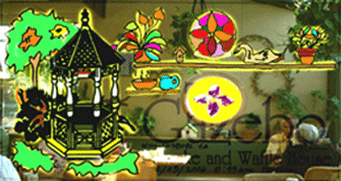

Now this is breakfast.
October 5, 2006
Breakfast and a class at William and Mary
Posted October 5, 2006 by Kevin Dayhoff
Breakfast at The Gazebo in
I can’t find a current syllabus on-line. I received a current syllabus electronically from the student that has facilitated me attending the class. I found a similar syllabus for the class, from 2004, here:
This course will examine the works of several key political philosophers in the Western tradition, starting with the Greeks, through the Romans up to early Christian political thought. We will be concerned to read and analyze these thinkers’ central texts, seeking to discern what is being said, what this tells us about the politics of the societies in which they were written, and how this compares and contrasts with our own society and thought about politics. In addition to the study of specific thinkers and specific texts, we will also seek to consider more broadly what it means to think critically about politics, and the strategies available for doing so.
Course Requirements: Two short papers (6-8 pages) 30% each; Final Examination 30%; and class attendance and participation, 10%.
Required Texts: Available in the Bookstore.
Thucydides History of the Peloponnesian War (trans: Rex Warner)
Plato The Republic (trans: Allan Bloom)
Aristotle The Politics (trans: Carnes Lord)
Augustine The Political Writings
The professor is Simon Stow. Simon Stow HOME - Bio - Publications - C.V. - Courses - Daisy - Government Department
Simon Stow received a BA in Politics, Philosophy and Economics from Corpus Christi College, Oxford in 1993; an MA in Political Science from McGill University in Montreal in 1997; and a Ph.D. in Political Science from The University of California, Berkeley in 2002. He joined the Department of Government at the
Professor Stow's research focuses on the use and abuse of literature in political thought and analysis. Arguing that -- influenced by a 'Political Turn' in literary criticism -- there has been a 'Literary Turn' in much contemporary political theory, he seeks to identify what is promising and what is problematic about the use of literature in contemporary political thought and analysis…
####
Kevin Dayhoff writes from

No comments:
Post a Comment
Note: Only a member of this blog may post a comment.